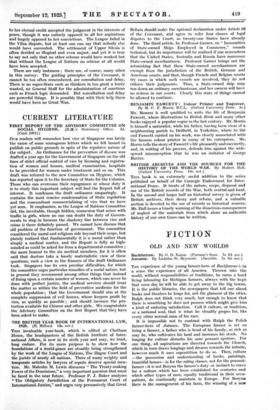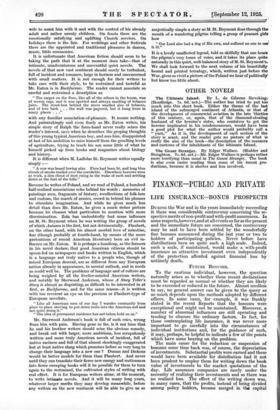FICTION
OLD AND NEW WORLDS
Tim experience of the young farmer-hero of Backfurrow is in a sense the experience of all America. Thrown into the world, without responsibilities or traditions, he earns a hard living labouring for Michigan farmers, always with the hope that some day he will be able to get away to the big towns. It is the public libraries, the newspapers that tell one about books and theatres he longs for, not the glamour of the cities. Ralph does not think very much, but enough to know that there is something he does not possess which might give him a kind of enduring satisfaction. Call it culture, or tradition, or a national soul, that is what he cloudily gropes for, like every other normal man of his race.
It is impossible not to contrast with Ralph the Polish farmer-hero of Autumn. The European farmer is set on being a farmer, a father who is head of his family, as rich as may be, who cultivates his land and increases his stock. No longing for culture disturbs his sane peasant egotism. For one thing, all aspirations are directed towards the Church, .which in turn draws longings and dreams towards the infinite, however much it uses superstition to do so. Then, culture —the possession and understanding of books, paintings, beautiful houses—is for the ruling classes, not for the peasant- farmer : it is not Boryna the farmer's duty or instinct to crave for a culture which has been established for centuries and which other types of men, equally traditional in their occu- pations, do continually maintain in Europe. For Boryna there is the management of his farm, the winning of a new
wife to assist him with it and with the control of his already adult and rather unruly children. On feasts there are the emotionally satisfying and uplifting Church services. On holidays there is the fair. For weddings and other festivals there are the appointed and traditional pleasures in dances, music, little ceremonies.
It is unfortunate that American fiction should seem to be taking the path that it at the moment does take—that of intimate, unadventurous and uneventful quiet novels. The novels of that new vast continent should surely be turbulent, full of incident and romance, large in horizon and unconcerned with small matters. It is not enough for their writers to
take care with their style, to be restrained and tasteful as Mr. Eaton is in Backfurrow. The reader cannot associate so careful and restrained a description as " The carpet on the floor, like all of the others in the house, was of woven rags, and it was spotted and always smelling of tobacco juice. The wood-box behind the stove smelled also of tobacco, and of tree bark . . . the wall was papered, but it hung loose in many places . . ."
with any familiar association-of-pleasure. It means nothing.
And painstakingly and even finely as Mr. Eaton writes, his simple story of Ralph the farm-hand never really seizes the reader's interest, save when he describes the groping thoughts of this young typical American boy, and sees him, disappointed at last of his ambition to raise himself from the gruelling levels of agriculture, trying to teach his son some little of what he himself picked up from books and magazines about biology and history.
It is different when M. Ladislas St. Reymont writes equally simply :—
" A cow was heard lowing afar. Fires had been lit, and long blue clouds of smoke trailed over the cornfields. Elsewhere harrows were at work, a dim cloud of dust rising in the wake of each and settling down at the foot of the hills."
Because he writes of Poland, and we read of Poland, a hundred half-realized associations echo behind his words : memories of paintings seen, fragments of history, recollections of folk-lore
and custom, the march of armies, crowd in behind his phrases to stimulate imagination. And while he gives much less detail than does Mr. Eaton, he gives a much richer picture because he chooses what particulars to mention with more discrimination. Zola has undoubtedly had some influence on M. St. Reymont when he was writing the group of novels
of which Autumn is the first, but not detrimentally. Flaubert,
on the other hand, with his almost morbid love of minutiae, has (though probably at fourth-hand, by means of the more pretentious of recent American literature) been an evil in- fluence on Mr. Eaton. It is perhaps a handicap, as the farmers in his novel declare, that good American citizens should be spoon-fed on newspapers and books written in English, which is a language not truly native to a people who, though of mixed European descent, are as different from any European
nation already in appearance, in mental outlook, and in needs as could well be. The problems of language and of culture are being weighed by all the livelier-minded American writers, and notably by Sherwood Anderson, whose A Story Teller's Story is almost as dispiriting, as difficult to be interested in at first, as Backfurrow, and for the same reason—it is written with too reverent an eye on the precious or Flaubert-type of
European novelists.
" Like all American men of our day I wander constantly from place to place striving to put down roots into the American soil and not quite doing it." "The idea of permanent residence has not taken hold on us."
Mr. Sherwood Anderson's book is full of such cries, wrung from him with pain. Having gone so far, is it not time that he and his brother writers should seize the obvious remedy, and break out with larger, more ambitious, less scrupulously written and more truly American novels of incident, full of native raciness and full of that almost shockingly exaggerated but at least native slang which promises before so very long to change their language into a new one ? Dumas and Dickens would be better models for them than Flaubert. And never until they can translate their fierce new energy and restlessness into fierce sweeping books will it be possible for them to turn again to the restrained, the cultivated styles of writing with real effect. It is for European writers alone, at the moment, to write intimate novels. And it will be many long years, whatever larger merits- they may develop meanwhile, before any writers on the new continent will be able to give us so majestically simple a story as M. St. Reymont does through the mouth of a wandering pilgrim telling a group of peasant girls how
" Our Lord also had a dog of His own, and suffered no one to use it ill."
It is a lovely unaffected legend, told so skilfully that one hears' the pilgrim's very tones of voice, and it takes its place quite naturally in this quiet, well-balanced story of M. St. Reymont's. We shall look forward to the next volume of his beautifully bound and printed tetralogy, which, written just before the War, gives so vivid a picture of the Poland we hear of politically' but know too little about.











































 Previous page
Previous page